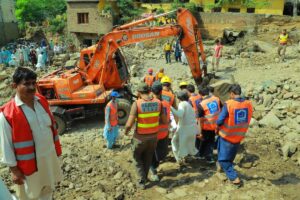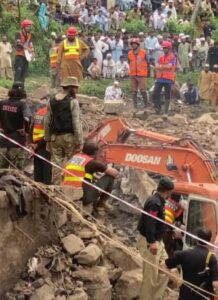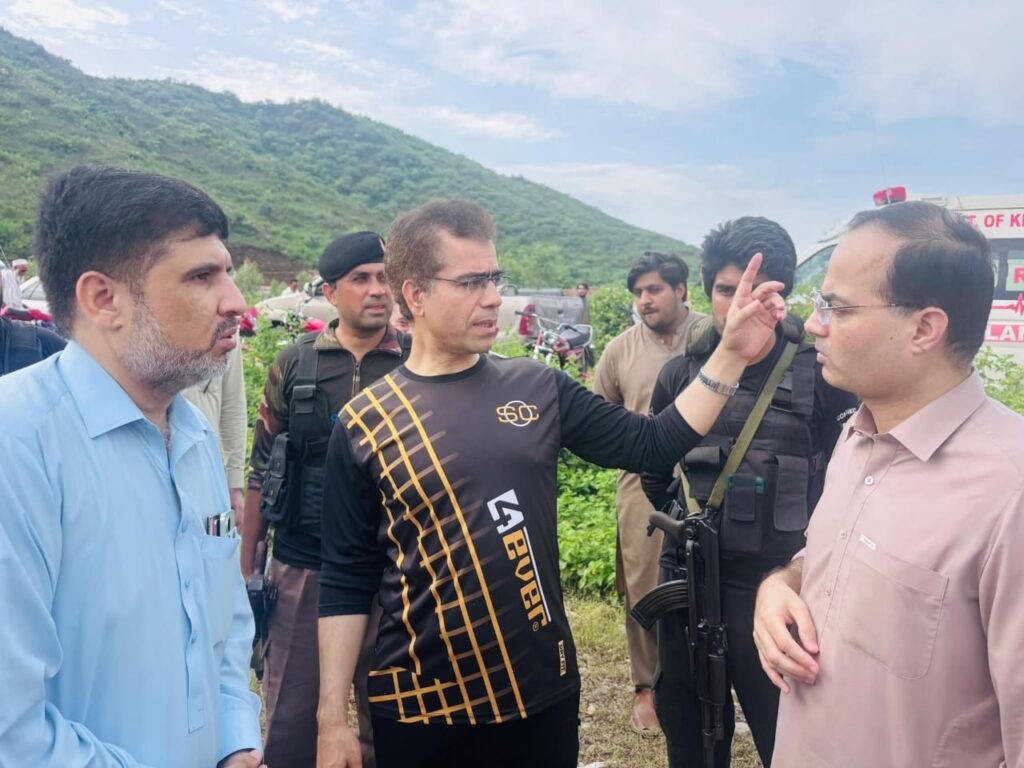By: Shams-ul-Haq
Regional Information Officer Mardan
On the morning of August 18th, in the scenic yet underdeveloped mountainous region of Darolai Bala in Swabi District, Khyber Pakhtunkhwa, something happened that we usually only see on television or read in newspapers. But on the that day, nature unleashed a fury so intense which turned a peaceful village into a scene of devastation within minutes.
At around 8:30 AM, the sky didn’t just rain — it broke open. A sudden and violent night cloudburst over the hills of Gadoon brought torrential rains that transformed the landscape in moments. The flash flood, carrying boulders, mud, and uprooted trees, surged down from the personnel mountains and struck the villages directly. In few minutes, homes were torn apart, and cries of terror and despair filled the air.
Loss of Life, Grief, and Lives Buried Under Rubble
In this tragic incident, 41 precious lives were lost. People going about their morning routines — preparing breakfast, feeding their children, tending to chores — vanished under the weight of nature’s fury. Dozens of houses were completely destroyed, and many individuals were initially reported missing.
According to eyewitnesses, dark clouds suddenly gathered overhead, followed by a torrential downpour unlike anything they had seen before. The sheer force with which the flood and debris crashed down from the mountains was beyond human resistance.

Rescue Efforts, Hope, and Humanity in Action
As soon as news of the disaster spread, the Khyber Pakhtunkhwa government sprang into action. On the directives of Chief Minister Ali Amin Gandapur, Commissioner Mardan Nisar Ahmad and Deputy Commissioner Swabi Nasrullah Khan rushed to the site. Teams from Rescue 1122, Alkhidmat Foundation, Pakistan Army’s SSG commandos, Civil Defence, and local villagers began a desperate search and rescue operation.
However, a part of the road near the Bada Check Post had been swept away, preventing heavy machinery from reaching the site. Despite these hurdles, the spirit of human resilience prevailed. By evening, seven bodies had been recovered, and the remaining missing individuals were located under the debris the next day.
Political and Administrative Response:
The Chief Minister Ali Amin Gandapur visited the disaster-hit area the following day. A high-level meeting was held attended besides Chief Secretary Khybar Pakhtunkhwa Syed Shahab Ali Shah, Former Speaker National Assembly Asad Qaisar, MNAs Shahram Khan and Junaid Akbar, the meeting was also attended by members of provincial cabinet. Assessments were made, and aid packages were announced. Affected families would be given cash assistance instead of food packages, compensation for completely or partially damaged houses, loss of livestock, and even for vehicles washed away by the floods.
But more importantly, the Chief Minister acknowledged something rarely spoken aloud: that illegal encroachments on waterways, poor planning, and the failure to address climate risks by previous governments have all contributed to such tragedies.
He pledged a major new initiative — the clearing and widening of waterways across the province, and relocation of vulnerable populations from landslide-prone and flood-risk mountainous areas.

A Lesson for the Future: Will We Learn?
This disaster wasn’t just a natural calamity — it was a wake-up call. Climate change, reckless development, and disregard for natural systems are pushing us closer to the edge.
The martyrs of Darolai Bala cannot be brought back. But their sacrifice must not go in vain. The real tribute to them will be concrete action — in planning, preparedness, and prevention. A cloudburst is no longer a rare occurrence; it is a reality, a threat that is sounding an alarm we can no longer ignore.
Conclusion
The tragedy in Swabi is not just a story of loss, but a reflection of our collective failures. Will we remain indifferent, or is this finally the time to act? That is a question for all of us.

